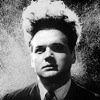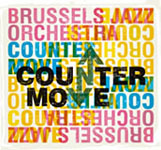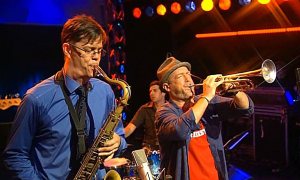Home » Jazz Articles » Genius Guide to Jazz » Cecil Taylor: Tackling the Ivories
Cecil Taylor: Tackling the Ivories
It was at the Conservatory that Taylor acquired the chops to be able to say 'Technique is a weapon to do whatever must be done' without sounding like a smartass.
 Which brings us to Cecil Taylor.
Which brings us to Cecil Taylor.It has been said of Taylor (not by me, of course. I know better) that he doesn't play piano, he plays 88 tuned drums. Do you feel any better knowing that? Of course not. Which is why we'd all be better off if whoever had said that would've just kept his damned mouth shut. But here we are. Cat's out of the bag now, so to speak.
So, then.
If there were a true original in jazz, Cecil Taylor would be one of them. And I'd be the other. And we'd have our own secret handshake, with regular club meetings. Mrs. Genius would make her butternut squash soup for him, we'd watch Sealab 2021 on DVD until he got sleepy and then we'd put him into his jammies and off to bed.
Or am I thinking of Bud Powell?
 Nonlinear, defiantly structureless and yet perfectly ordered, both without and beyond meaning. These are the sort of things a lesser jazz writer might haul out of the bag (not the same bag the cat was in) to describe Taylor's playing. Not me, not Uncle Genius. No, kids. I'd say things like "wholesome, "buttery, and "filled with country goodness. Then I'd nod, just so, and you'd know exactly what I meant. Take that, Gary Giddens.
Nonlinear, defiantly structureless and yet perfectly ordered, both without and beyond meaning. These are the sort of things a lesser jazz writer might haul out of the bag (not the same bag the cat was in) to describe Taylor's playing. Not me, not Uncle Genius. No, kids. I'd say things like "wholesome, "buttery, and "filled with country goodness. Then I'd nod, just so, and you'd know exactly what I meant. Take that, Gary Giddens.But seriously, folks.
Revolutionary War hero and fellow Virginian "Light Horse Harry Lee said of Taylor, "Time has no meaning to him, for I've been dead near 200 years. I'm paraphrasing, of course, but you see just how seminal a figure Taylor would have been had he been more willing to shoot at British people. But Taylor has never been one to do the expected, so we'll have to judge him based on his body of work or merely on height alone.
 Had he graduated from the prestigious New England Conservatory, which he did, we would've called him a genius. And he may be. Or, he could just be banging on a piano and taking us all for a ride. That's between Cecil and his God. I vote genius, and the bill passes 112-96 (HR 2133). But Taylor, the innovator, the barrel-chested Canuck, the peace-loving Quaker schoolmarm, has created a body of work as challenging and rewarding as any in the compendium of Our Music. And yet, did you even think to send him a Christmas card last year?
Had he graduated from the prestigious New England Conservatory, which he did, we would've called him a genius. And he may be. Or, he could just be banging on a piano and taking us all for a ride. That's between Cecil and his God. I vote genius, and the bill passes 112-96 (HR 2133). But Taylor, the innovator, the barrel-chested Canuck, the peace-loving Quaker schoolmarm, has created a body of work as challenging and rewarding as any in the compendium of Our Music. And yet, did you even think to send him a Christmas card last year?Suddenly.
Durable. Is the word I'd use to describe any piano which can stand up to Taylor's playing. To withstand the onslaught, the ten-fingered dreadnought, the German umlaut (in Bösendorfer, his preferred axe) must be to know what it is to truly live if you're a piano. Which you're not, I know, but I'm just saying.
 Cecil Percival Taylor was born in Long Island City on either March 15 or 25, 1929 or 1933, depending on which line of bunk you buy into. Born into a musical household, where even the pictures on the walls sang Jerome Kern songs, by age 6 Taylor was already studying the piano, suspecting it of stealing his yo-yo. Did this unleash his sonic fury on the keyboards? We may never know, since he has probably got another yo-yo by now.
Cecil Percival Taylor was born in Long Island City on either March 15 or 25, 1929 or 1933, depending on which line of bunk you buy into. Born into a musical household, where even the pictures on the walls sang Jerome Kern songs, by age 6 Taylor was already studying the piano, suspecting it of stealing his yo-yo. Did this unleash his sonic fury on the keyboards? We may never know, since he has probably got another yo-yo by now.It was at the New England Conservatory that Taylor discovered the atonalist crowd, Schoenberg and Webern and the like, smoking out in back of the cafeteria with the bad kids, turning him on to the notion of a land that lay beyond the safety of the Circle of Fifths (much like that place where Peter Ustinov was hanging out in Logan's Run [1976]). It was at the Conservatory that Taylor acquired the chops to be able to say "Technique is a weapon to do whatever must be done without sounding like a smartass. It was at the Conservatory that Taylor first heard Brubeck, Lennie Tristano, and the sound a commercial refrigerator makes when the compressor is about to go. All of these things later figured into this article about him, which goes to show you, be careful of the company you keep.
From 1967 to 1977, Taylor struggled with the music business. He worked as a record salesman, cook, and dishwasher before going on to teach at the University of Wisconsin and New Jersey's Glassboro State, after which he was all too glad to go back to washing dishes. He was also gaining popularity in Europe, where professional wrestling never really has seemed to catch on, and accumulating respect within the jazz hierarchy here at home. He was elected to Down Beat's Hall of Fame in 1975, and again in 1977 just to make sure it took.
 The late 50's saw Taylor experiment with elements of post-bop on his first album, Jazz Advance, with saxophonist Steve Lacy and classical bassist Buell Niedlinger. At a time when the Free jazz movement was beginning to gain ground, finally gaining respectability with its 27-21 upset of the Bop school in the All Jazz championship in 1958, Taylor was as significant a figure as Ornette Coleman and perhaps moreso, because his name is easier to spell. Forging an alliance with saxophonist Jimmy Lyons in 1961, the Cecil Taylor Unit moved boldly into the future, wearing a false mustache and affecting a limp just to throw off The Man.
The late 50's saw Taylor experiment with elements of post-bop on his first album, Jazz Advance, with saxophonist Steve Lacy and classical bassist Buell Niedlinger. At a time when the Free jazz movement was beginning to gain ground, finally gaining respectability with its 27-21 upset of the Bop school in the All Jazz championship in 1958, Taylor was as significant a figure as Ornette Coleman and perhaps moreso, because his name is easier to spell. Forging an alliance with saxophonist Jimmy Lyons in 1961, the Cecil Taylor Unit moved boldly into the future, wearing a false mustache and affecting a limp just to throw off The Man.Now in his mid 70's, Taylor continues to remain active. A documentary released on DVD entitled All the Notes, provides a visual exploration of Taylor's life and music, stopping just short of revealing his famous pecan shortbread recipe hinted at on 1966's seminal Unit Structures if you know how to listen for it. A lifetime in music has brought Taylor worldwide acclaim, a McArthur Genius Award, an audience with the President (albeit Jimmy Carter), and a unique place in the pantheon of American music that Barry Manilow couldn't find with a GPS and a Tibetan sherpa.
 No mention made of Taylor's poetry, or his love of dance, except this one, tucked almost unnoticed into the aftermath of this piece. No chin-scratching debate over the merits of his work, nor devotional ode to same. No exploration of his manifold eccentricities, even if I were in a calling-the-kettle-black mood, and not one single word about the possibility that his music may in fact be coded messages sent to Prince Hall Freemasons worldwide. Just Taylor, in hints and gags and hindsight, left to be considered alone and on his own terms.
No mention made of Taylor's poetry, or his love of dance, except this one, tucked almost unnoticed into the aftermath of this piece. No chin-scratching debate over the merits of his work, nor devotional ode to same. No exploration of his manifold eccentricities, even if I were in a calling-the-kettle-black mood, and not one single word about the possibility that his music may in fact be coded messages sent to Prince Hall Freemasons worldwide. Just Taylor, in hints and gags and hindsight, left to be considered alone and on his own terms.I'm sure he wouldn't have it any other way.
Till next month, kids, exit to your right and enjoy the rest of AAJ.
Tags
PREVIOUS / NEXT
Support All About Jazz
 All About Jazz has been a pillar of jazz since 1995, championing it as an art form and, more importantly, supporting the musicians who make it. Our enduring commitment has made "AAJ" one of the most culturally important websites of its kind, read by hundreds of thousands of fans, musicians and industry figures every month.
All About Jazz has been a pillar of jazz since 1995, championing it as an art form and, more importantly, supporting the musicians who make it. Our enduring commitment has made "AAJ" one of the most culturally important websites of its kind, read by hundreds of thousands of fans, musicians and industry figures every month.
























